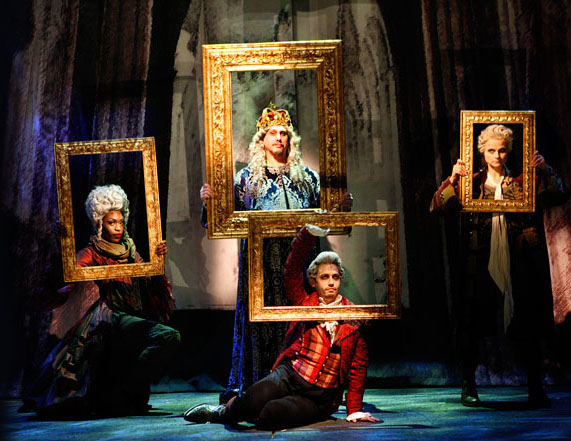
A young man with a hideously disfigured face has become a member of a travelling show. One day he removes his bandages and discovers that the sight of his injuries has a strangely transformative effect upon his audience. They become happier, more caring and more fulfilled, but he remains tormented by the need to discover how he came to be so cruelly scarred. Who did this to him?
The strange story of The Grinning Man brings the Bristol Old Vic’s 250th anniversary programme to a triumphant conclusion. It is five years since Artistic Director Tom Morris sounded out writer Carl Grose and composers Tim Phillips and Marc Teitler to see if they thought a musical version of Victor Hugo’s sprawling novel L’Homme Qui Rit was a possibility. Renowned puppeteers Finn Caldwell and Toby Olié of Gyre and Gimble joined the team, and their work is a major feature of the show. They have created a rather magnificent pet wolf, and there are occasions when puppetry is used for flashback sequences, depicting the two central characters when they were young children. There is even one sequence when we see these two puppets tell a story through their puppets.
Taking his cue from German expressionist silent films, designer Jon Bausor has revelled in the dark and disturbing nature of the tale, transforming the proscenium arch into a huge torn mouth. The opening number, Laughter Is The Best Medicine, is sung by Barkilphedro, the king’s embittered clown. He explains that this is a world where the only way to take any pleasure in life is to find someone even more miserable than yourself and mock their misfortune. Julian Bleach’s Barkilphedro is a would-be social climber, consumed with thwarted ambition. He addresses us directly; he is both clown and narrator. Bleach is very experienced in this kind of sardonic role, having been the Emcee in both Shockheaded Peter and in Cabaret. His gleefully malicious Barkilphedro introduces us to a feudal Bristol where a tyrannical king rules over his cruelly oppressed people. Their only entertainment is provided by the Stokes Croft Fair, which features a freak show. Here we find Grinpayne, the Grinning Man himself, and Dea, a young women struck blind in childhood by a traumatic event. Petite Audrey Brisson poignant portrayal of Dea is very moving. We last saw her at the Old Vic as Chagall’s wife Bella in The Flying Lovers Of Vitebsk, and she brings to this role an equally enchanting mixture of outward delicacy and inner strength. Grinpayne is played by Louis Maskell, who responds magnificently to the challenge of conveying all of his character’s qualities with his face is hidden behind bloodied bandages. Both Brisson and Maskell have fine singing voices, and they deliver Phillips’ and Teitler’s soaring melodies to thrilling effect.
Musically The Grinning Man has the same kind of uplifting, epic quality of Les Miserables, but in tone this show is more varied. Just when there seems to be a danger of wallowing in sentiment the mood is punctuated by broad comedy. Much of the fun is supplied by the grotesque characters who inhabit the royal court. Among these are foppish Lord David Dirry-Moir, played Stuart Neal with many an improvised aside to the audience. There is also Duchess Josiana, half-sister to Lord David with a rampant hedonist taste for incest. Gloria Onitiri plays Josiana as a comic mix of tortured soul singer and unashamed nymphomaniac.
The Grinning Man is an extraordinary amalgam of fairy-tale, puppetry, romantic drama and black comedy, all infused with a hefty dose of the macabre. In less sensitive hands this mixing of genres and styles could be alienating, or even downright confusing, but The Grinning Man has an underlying solidity and coherence that generally binds all these disparate elements together in a very satisfactory way. At times I feel that there are sudden shifts in tone that are too uncomfortable, too disruptive of the narrative flow, but these jarring moments are few and far between. The dialogue is frequently very witty, the singing is glorious and often this tale of a damaged man’s journey of self-discovery is very moving. Last night’s performance received a well-deserved standing ovation. This is a must-see show. ★★★★☆ Mike Whitton 21st October 2016
Photography credit: Simon Annand

